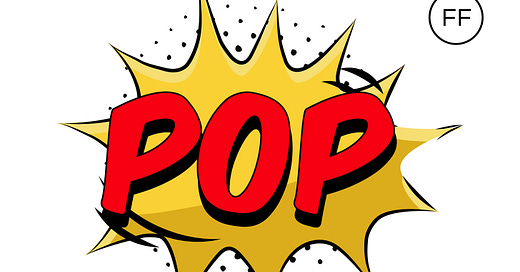I Like Pop (Not the Popular Kind)
a.k.a. Examining my own musical biases, and the troubles that come with a word that means so many different things.
Last Friday was my wife Dania’s birthday, and we decided to celebrate with a little weekend getaway to the Pyrenees. (If you’re wondering why this newsletter is arriving a bit later than usual, the eight-hour hike we took on Sunday—and my slow recovery from it—is definitely a factor in my tardiness.)
We rented a car for the trip, and on the way there, my wife was in charge of the aux cord. As she likes to remind me, her musical tastes often go far deeper than my own, but the sun was shining, she was in a good mood, and things like free jazz, grotty post-punk and long-form experimental composition don’t make for the best road-trip soundtrack. Dania wanted to have some fun, so she quickly started blasting upbeat pop and hip-hop tunes at a high volume. I can’t remember them all, but the likes of Kendrick Lamar, The Weeknd, A$AP Rocky, Lana Del Rey, The Smiths, The Magnetic Fields and The Knife were all played at one point or another. Not all of these selections were to my personal taste, but it was her birthday weekend and I didn’t want to foul up the vibe, so I mostly stayed quiet and focused on driving.
Unfortunately though, my face wasn’t quite so neutral, and about an hour into the trip, Dania asked me point blank, “Is the music annoying you?” I paused a moment, and decided I didn’t want to lie, so I said something like, “Yes, but it’s fine. You’re having a good time. I just don’t like pop music.”
Thankfully this didn’t escalate into a big argument—we stopped for lunch shortly afterwards, and when we got back in the car, the USB cable ironically stopped working altogether—but in the days since then, I have been mulling over what I said:
“I don’t like pop music.”
Is that really true? And even if it is, what does that sentiment actually mean? Although the word “pop” is derived from “popular,” its practical definition is far more complex than that. Is it an aesthetic rooted in particular forms of songwriting? Is it merely a marker of commercial success? Perhaps it’s simply a measure of familiarity, and is largely independent of what the music actually sounds like. Or maybe it’s a description of intention, denoting that the artist (and / or their team and label) are purposely attempting to connect with a mainstream audience.
In my own work, the word “pop” has been used in all of these contexts, and while it’s true that I rarely employ the term in a celebratory way—a hesitance that absolutely stems from a younger version of myself and the mindset I picked up from various independent music scenes during the ’90s and 2000s—I also can’t deny that some pop (and pop-adjacent) tunes do wind up getting covered here in the newsletter. Few of those tunes are legitimately popular—you’ll still need to look elsewhere for the latest Charli XCX discourse—but whether they feature a catchy chorus or just sound like something that initially grew out of an artist casually strumming on an acoustic guitar, there’s something unmistakably pop about them.
So, clearly, I do like some pop music, but what kind? Luckily, I have a sizable data pool to work with (i.e. everything I write about in this newsletter), and in the interest of sussing out my own critical filters and seeing where my tastes currently lie, I went through all the weekly track recommendations I made during the first half of 2024. I didn’t expect to find much pop music in there—after all, electronic music is my primary focus—but even when I applied a rather generous definition of what constitutes “pop,” I wound up with… 10 tracks total.
That’s not many, but looking more closely at those 10 tracks told me a lot about myself and, more importantly, my own biases.



